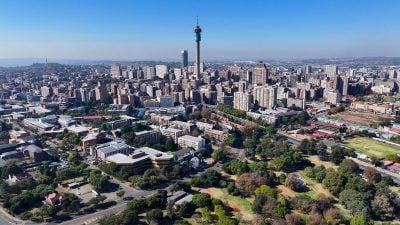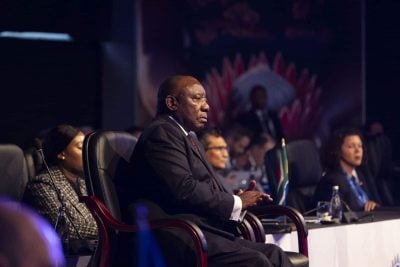World Economic Forum co-chair Winnie Byanyima, the executive director of Oxfam, is ready to call corporate and business leaders to task on global issues of inequality, human rights and climate change when they meet in Davos this year.
Rising inequality and climate change are the defining challenges for 2015, says Winnie Byanyima, the executive director of Oxfam International and the only African co-chair of the World Economic Forum in Davos, who says that she will be heading to the global talking shop “to ask hard questions and broach difficult subjects.”
“Extreme economic inequality is out of control globally, and getting worse. At the same time, the impacts of climate change are exacerbating this growing divide,” she says. “I have seen first-hand the impact that climate change is having on the poorest and most vulnerable people.”
Leaders have begun to understand the risks to Africa’s future prosperity and stability of both of these challenges, she says. Extreme poverty on the continent is in decline, and the continent’s GDP growth over the past decade – fuelled in large part by natural resources – has provided many reasons for optimisim.
“But this growth has not been inclusive. A schizophrenic economic profile – sharp growth, but with many people still locked into poverty – has resulted in ballooning inequality,” Byanyima says.
Just as seven of the fastest growing countries of the world are in sub-Saharan Africa, six of the most unequal countries in the world are in the region.
“The good news is this situation can be turned around. With good policies and implementation, Africa’s resources and growth can be leveraged to benefit all its citizens, in ways that are fair and sustainable.”
Governments can start to redress this economic imbalance by investing their resources in public services, such as healthcare and education, Byanyima says. This redistributes resources by giving citizens “virtual income”. Alongside this, national governments and international organisations need to address the huge losses that the continent faces from tax evasion, capital flight and illicit financial flows.

Africa loses $63bn every year to illicit flows and tax dodging, according to Oxfam – the amount lost over the last three decades is almost equivalent to the entire GDP of the continent today. The NGO is asking for a global tax summit this year, to bring together rich and poor nations to discuss the “broken” international tax system and to lay the groundwork for a permanent global body to set and arbitrate fair rules.
“Fragmented global tax rules that reward those who avoid their civic obligation, leaving the poorest to foot the bill, must be re-written,” Byanyima says.
“The consequences for failing to deal with inequality in Africa and globally will be that democracies will continue to be corroded, conflict will be fuelled, and social problems will multiply,” she warns. “There is also growing agreement that extreme income inequality will undermine growth itself. We need sustainable solutions to Africa’s problems and tackling extreme inequality has to be part of the way forward.”
Global elite
Davos is among the world’s most famous global talking shops, where heads of state sit side-by-side with CEOs to politely discuss topics of international significance. As the head of one of the world’s most influential charities, Byanyima has a rare opportunity to shake up the often genteel and diplomatic atmosphere.sphere at the event.
“Let’s be clear, sharing a platform with someone does not mean sharing their views. I’m headed to Davos to ask hard questions and broach difficult subjects,” she says. “I’ll be putting out the message that there is nothing inevitable about inequality. We need to take on vested interests and make the policy choices needed for a fairer distribution of the world’s wealth.”
Byaniyima says that she will work to represent the people outside the global elite who are most impacted by political and commercial decisions taken at the top.
“There’s no doubt that the people most affected by economic policy, income inequality, climate change and the raft of other issues debated at Davos should be part of the discussion. Civil society and public engagement must be stepped up in all forums,” she says.
“It’s important that the voices of people broadly are represented at meetings of the global elite, and there are different ways of doing that. Davos isn’t a formal decision making forum like the G20 or G8. But I’m attending because I see this as an opportunity to raise our concerns with business and world leaders and to point out the consequences their actions have for poor people around the globe.”
The World Economic Forum’s willingness to put an NGO leader whose forthright views could be antagonistic to the political and business leaders on stage could be a sign that there is a growing entente between governments, commercial interests and civil society when it comes to solving global problems.
“I think that where the dynamic between civil society, business and governments has shifted in recent years has been that there is now an overwhelming consensus that things must change,” Byanyima says. “The World Economic Forum itself has listed growing income inequality as a major global risk for several years running. Business leaders, faith leaders, and leaders of governments agree that extreme and growing inequality must be tackled urgently. What’s needed now is solutions.”
Corporate responsibility
The Davos stage and side events are typically platforms for corporate leaders to launch social responsibility and development initiatives and contribute to the debate on global issues from sanitation and public health to nutrition, climate change and human rights.
Corporate social responsibility — once a euphemism for narrow philanthropy — has evolved into a more philosophical, holistic discipline over the past decade. Business leaders say that this is due to a a greater understanding of social and environmental sustainability — itself a function of the necessity of moving into high-growth developing markets.
Oxfam has targeted multinationals in its advocacy, trying to ensure that they and their customers understand their impacts on developing societies and the environment. Consumer goods and agriculture companies in particular have faced intense pressure to examine their supply chains in developing countries, first to limit the damage done by unscrupulous suppliers and poorly-conceived projects, and secondly to find ways to leverage their wider business for positive development impact.
The NGO’s ‘Behind the Brands’ campaign picked 10 of the food and drink companies in the world and took them to task on issues in their supply chains.
Those companies that are under pressure from consumers, communities and investors are making significant strides in their thinking, according to Byanyima.
“Land rights have been of particular concern to us — “land grabbing” from small farmers and communities to make way for foreign investors and industrial export crops is a major problem across the developing world,” she says. “In one year, we’ve seen all kinds of movement. Coca-Cola and Pepsi committed to zero tolerance for land grabbing in their supply chains, and this in turn influenced the other companies, and major producers and traders who hold even greater influence over conditions on farms.”

This movement is certainly positive, but still too much is happening at the rhetorical level, rather than on the ground, where it matters.
“Most of the shift is happening at what you could term the 30,000 foot level – corporate commitments to human rights, transparency, sustainability, and stakeholder engagement,” Byanyima says. “There is still a way to go at the level of having affected communities, farmers and other stakeholders participate in and shape multinational companies’ corporate social responsibility initiatives.”
There are some critical issues that companies are still uncomfortable discussing, however.
“The issues that are easy for companies to talk about are public private partnerships, philanthropy, and social enterprise. We’re seeing real progress with multinationals on environmental issues,” Byanyima says. “What’s tougher for companies to talk about are social issues and human rights. Transparency, full supply chain tracing, and accountability are more difficult – basically anything that threatens corporate control and power is still very much resisted.”
Giving marginalised groups access to economic and environmental resources is fundamental to solving the issues of inequality and climate change. If companies want to make genuine strides towards ameliorating the world’s most pressing concerns, they will need to overcome this reticence, according to Byanyima.
“The current debate around inequality poses a significant challenge to corporate social responsibility orthodoxy, because it moves the focus towards issues of power and politics,” she says. “Focusing on inequality raises the bar for the impacts of corporate social responsibility initiatives and programmes. It shifts the focus from creating incremental benefits at the local level, to how the benefits of these initiatives are distributed, particularly among the poorest and most marginalised groups.”
This debate is also uncomfortable for governments, as it means that they need to acknowledge that the balance of power has in some cases shifted from the political sphere to the corporate one, and that global influence is weighted towards business, rather than the polis.
“As far as governments are concerned, they’re also keen to talk about the need for public private partnerships, but less so about the fact that global corporate expansion has been accompanied by shrinking governments, with power and resources shifting from the public to private sector. Large corporations now have outsized influence,” Byanyima says.
“It’s not often enough acknowledged that democracies are undermined, in developed and developing countries alike, when the wealthiest use their financial power and the influence that comes with it to bend laws and policy choices in their favour.
To read the full special report please click here
Want to continue reading? Subscribe today.
You've read all your free articles for this month! Subscribe now to enjoy full access to our content.
Digital Monthly
£8.00 / month
Receive full unlimited access to our articles, opinions, podcasts and more.
Digital Yearly
£70.00 / year
Our best value offer - save £26 and gain access to all of our digital content for an entire year!
 Sign in with Google
Sign in with Google 


